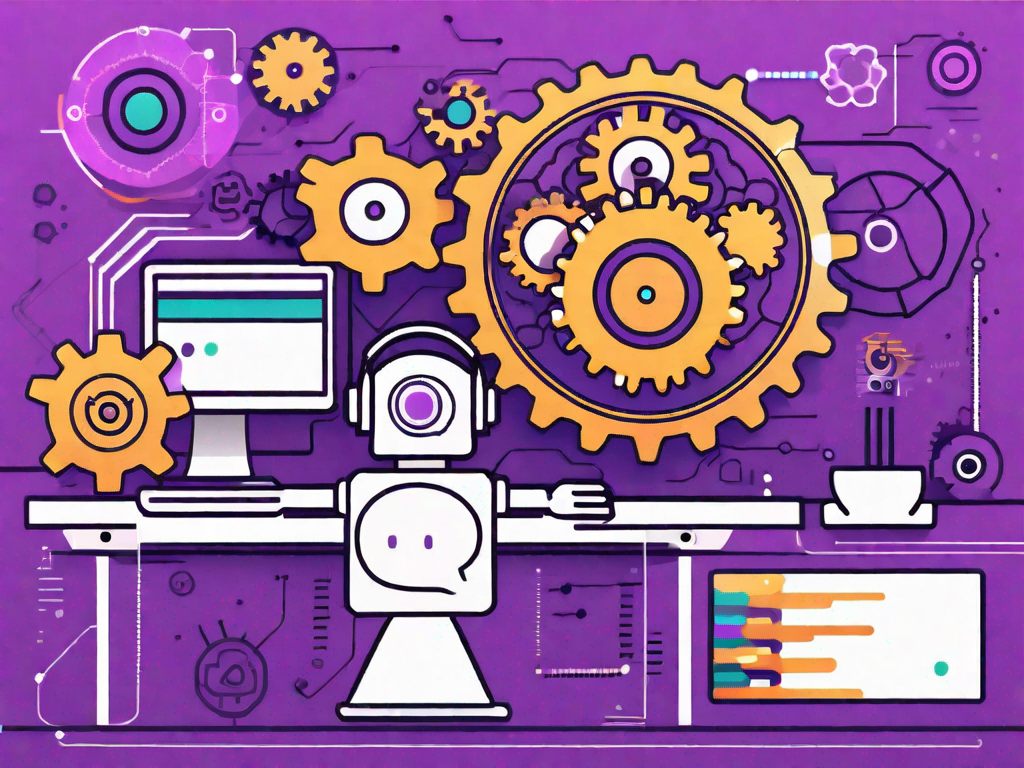With the introduction of AI in customer service, the benefit of repetitive inquiries automation through self-service is becoming a reality. How can the automation of repetitive tasks help your business?
To answer that question in this article, we will examine the true cost of repetitive inquiries and the difficulties of automating customer inquiry management prior to AI. We will then discuss the use of ChatGPT and generative AI as an effective approach to addressing these issues.
Additionally, we provide a step-by-step guide for creating a scalable self-service solution to repetitive inquiries automation. Finally, we delve into the future of customer service with ChatGPT and ponder the question of whether there will still be a need for live agents.

The True Cost of Repetitive Inquiries
Repetitive inquiries can be a major drain on a company’s resources. Each inquiry takes up valuable time. But it also consumes the attention of customer service representatives who could otherwise be addressing more complex and unique customer issues. This inefficiency can ultimately result in decreased customer satisfaction and increased support costs. To truly understand the impact of repetitive inquiries, companies must carefully analyze the time and effort invested in handling them.
Opportunity Cost
One of the key factors to consider when evaluating the true cost of repetitive inquiries is the opportunity cost. When customer service representatives are tied up with handling repetitive inquiries, they are unable to dedicate their time and expertise to more critical matters. These matters could include resolving complex customer issues, providing personalized assistance, or even proactively identifying potential problems before they escalate. By diverting resources away from these higher-value activities, companies may miss out on opportunities to enhance customer loyalty and drive long-term growth.
Agent Turnover Costs
Repetitive inquiries can have a negative impact on employee morale. Constantly addressing the same basic questions can be monotonous and demotivating for customer service representatives. This can lead to decreased job satisfaction and increased turnover rates within the customer service department. As a result, companies may find themselves in a perpetual cycle of hiring and training new employees, further adding to the overall cost of repetitive inquiries.
Actual cost
Repetitive inquiry cost can be determined by using the following formula:
Cost of Repetitive Inquiry = (Total time spent on handling repetitive inquiry * Cost per hour of the agent) + Additional Costs
Additional costs may include any overhead, tools or resources used to handle the inquiries. Please note that this is a basic formula and real calculations might require more specific details such as the complexity of the inquiries, efficiency of the agent, etc.
The true cost of repetitive inquiries extends beyond the immediate time and resources they consume. It impacts employee morale, customer satisfaction, and overall support costs. By carefully analyzing the impact of repetitive inquiries and implementing a balanced approach that combines self-service options with human interaction, companies can minimize the negative effects and maximize the value they deliver to their customers.
Human Agent Hires to Handle Repetitive Inquiries
While it may seem more cost-effective to hire additional customer service representatives to handle the influx of inquiries, this approach is not without its downsides. The recruitment, training, and management of new employees can be costly and time-consuming. Even with the help of AI recruitment tools, which can streamline the hiring process, businesses still face challenges such as high turnover rates in the customer service industry. Therefore, adopting a self-service approach to address repetitive inquiries becomes increasingly attractive.
Another thing to think about is how businesses manage their employees. Using HR and payroll services can make it easier to manage tasks like paying workers, managing benefits, and following rules. This helps businesses spend less time on hiring and training new employees for simple tasks. Instead, they can focus more on improving customer service with self-service options.
Self-Service Options for Repetitive Inquiries
Implementing self-service options, such as comprehensive FAQs, knowledge bases, or automated chatbots, can significantly reduce the burden of repetitive inquiries on customer service teams. By providing customers with easily accessible and accurate information, companies can empower them to find answers to their questions independently. This frees up customer service representatives to focus on more complex issues. It also enhances the overall customer experience by enabling quick and efficient self-resolution.
Self-service options can be highly effective for addressing repetitive inquiries. However, there will always be situations where customers require personalized assistance. In these cases, it is crucial to have well-trained customer service representatives who can step in and provide the necessary support. Investing in ongoing training and development programs for customer service teams can help ensure that they are equipped with the knowledge and skills to handle complex and unique customer issues effectively.
Difficulties of Automating Customer Inquiry Management Through Self-Service Prior to AI
Prior to the emergence of AI technologies, automating customer inquiry management through self-service proved to be a complex and challenging task. FAQ pages and search functions were often insufficient, leaving customers frustrated and unsatisfied. Inaccurate or outdated information would only exacerbate the problem, creating a negative experience for customers attempting to find the answers they needed.
Maintaining consistency in responses across various communication channels also posed a significant hurdle. It was difficult to provide the same level of support across live chat, email, and social media, resulting in a disjointed and unreliable customer experience. The lack of automation tools made it impossible to efficiently handle large volumes of inquiries, leading to delays and customer dissatisfaction.
Fortunately, with the advancements in AI, particularly in the field of generative AI (ChatGPT), new solutions to these challenges have emerged. Going forward, they may revolutionize the way companies automate customer inquiry management.
ChatGPT Addresses Repetitive Inquiries Effectively
ChatGPT, powered by generative AI, offers a promising solution for repetitive inquiry automation through self-service. It is a game-changer for customer support. ChatGPT and generative AI offer an effective and scalable solution that minimizes the cost and effort associated with handling repetitive inquiries. management through self-service. Built upon OpenAI‘s GPT (Generative Pre-trained Transformer) language model, ChatGPT can understand and generate human-like responses to inquiries. This breakthrough technology allows companies to provide accurate and relevant information to their customers, eliminating the frustrations associated with traditional self-service solutions.
By analyzing vast amounts of data, ChatGPT can learn to anticipate customer questions and provide informative responses. This proactive approach ensures that customers receive the help they need without having to navigate complex FAQ pages or engage in unfruitful searches.
A key benefit of ChatGPT is its ability to maintain consistency across different communication channels. With its generative AI capabilities, ChatGPT can generate tailored responses that align with a company’s brand voice and messaging style. And it can do so regardless of whether the interaction occurs through live chat, email, or social media platforms.
Data Limitations
You might run into a wee bit of a hitch though – ChatGPT has been trained on the entirety of internet data up until September 2021. And so, this digital oracle remains oblivious to any updates or new content produced post-September 2021. It also has a propensity to pull any Tom, Dick, and Harry’s information from the world wide web to answer customer queries. And we know you’d rather it stick to the script, a.k.a., your company’s data.
So how can we overcome this huge limitation?
Step-by-step Guide for ChatGPT/Generative AI: Creating a Scalable Self-Service Solution to Handle Repetitive Inquiries
Implementing a self-service solution using ChatGPT/Generative AI requires careful planning and execution. Here is a step-by-step guide to help companies create a scalable self-service solution:
1. Identify repetitive inquiries
Analyze customer inquiries to identify patterns and common themes. This will help determine which inquiries can be automated using ChatGPT.
With its unique analytical feature, LiveHelpNow helps save you time and resources in figuring out what repetitive inquiries you receive. By identifying the common issues being raised by your customers, you can understand what information they need the most and address those needs quickly and efficiently.
Utilizing these insights can help improve your customer service in a significant way. You can create new content on your knowledge base or develop canned responses in your chat system to answer frequently asked questions.
The LiveHelpNow automating analyses ensure that no issue or question goes unnoticed, keeping you one step ahead in providing excellent customer support. Even more, it empowers your team to easily manage customer inquiries through a streamlined and efficient workflow. With an up-to-date and comprehensive knowledge base, your customers will have self-service options reducing the load on service agents.
2. Train the model
Utilize pre-existing customer inquiries and responses to train the ChatGPT model for repetitive inquiries automation. Fine-tune the model to ensure accurate and contextually appropriate responses. In LiveHelpNow contact center software, no training is necessary. We train ChatGPT model on your data in real-time. Every disposed chat, ticket, SMS, or other customer interaction automatically trains the model by analyzing the intent, question, and resolution of each and feeding it into the model to be able to answer the question in the future. Every new canned response or knowledge base article is fed into the model automatically giving it yet another bit of knowledge to field inquiries without fail.
3. Integration
Integrate ChatGPT into the company’s customer service infrastructure, making it readily accessible to customers through various touchpoints.
LiveHelpNow’s Hue AI can be integrated with a click of a button and be used instantly in chatbots, ticket automation, and agent-assist.
4. Continuous improvement
Regularly evaluate and update the ChatGPT model based on customer feedback and new inquiries. This ensures that the system remains accurate and up-to-date.
Analytics is a big part of making sure AI works as expected and serves customers and agents well.
This is why we built a variety of reports not only tracking statistics of how many inquiries were resolved by AI but also showing exactly what questions were presented to AI and how exactly AI responded. We also identify whether the answer given by AI was found helpful or unhelpful. This allows to adjust content for unhelpful answers so they are accurate in the future.
5. Monitor and optimize
Continuously monitor the performance of the self-service solution to identify areas for optimization. This includes analyzing customer feedback, tracking inquiry resolution rates, and identifying opportunities to further enhance the customer experience.
More Ideas for Utilizing Chat GPT in Addressing Customer Service Tasks
While repetitive inquiry automation through self-service is a game-changer for customer support. ChatGPT and generative AI offer an effective and scalable solution that minimizes the cost and effort associated with handling repetitive inquiries. is a valuable application of ChatGPT, the technology can be harnessed for various other customer service tasks. Here are a few ideas:
- Automated Order Tracking: Allow customers to track their orders through conversational interactions with ChatGPT, minimizing the need for manual inquiries.
- Product Recommendations: Leverage ChatGPT’s ability to understand customer preferences and recommend products that align with their needs.
- Technical Troubleshooting: Use ChatGPT to guide customers through technical troubleshooting processes, providing step-by-step instructions and troubleshooting tips.
- Upselling and Cross-selling: Train ChatGPT to generate personalized product recommendations based on customer inquiries, enabling targeted upselling and cross-selling initiatives.
The Future of Customer Service with ChatGPT: Will There Be Still a Need for Live Agents?
As ChatGPT and generative AI continue to evolve, the question arises: will there still be a need for live agents in the future of customer service? While automation can significantly alleviate the burden of repetitive inquiries and improve efficiency, it is unlikely that live agents will become obsolete.
There are certain scenarios where human interaction is crucial, such as dealing with complex and emotionally charged issues. No matter how advanced AI becomes, it cannot fully replicate the empathy and understanding that a human agent can provide. Moreover, some customers may simply prefer interacting with a real person.
However, the role of live agents may evolve. With the support of ChatGPT, agents can focus on more complex and unique customer issues, providing a higher level of personalized support. By offloading repetitive inquiries automation to self-service solutions, companies can optimize the allocation of their human resources, resulting in a more efficient and satisfying customer service experience.
Repetitive inquiries automation through self-service is a game-changer for customer support. ChatGPT and generative AI offer an effective and scalable solution that minimizes the cost and effort associated with handling repetitive inquiries. By following a step-by-step guide, companies can seamlessly implement a self-service solution using ChatGPT. This can lead to increased customer satisfaction and improved operational efficiency.




